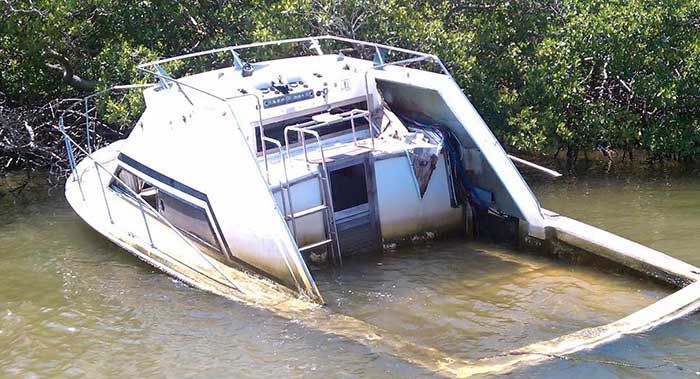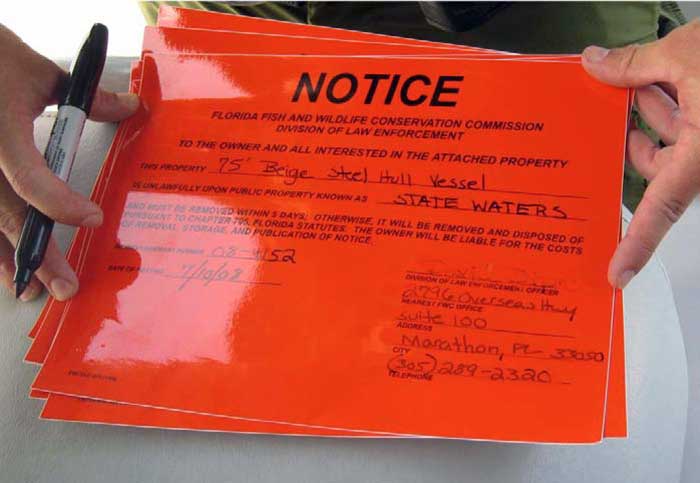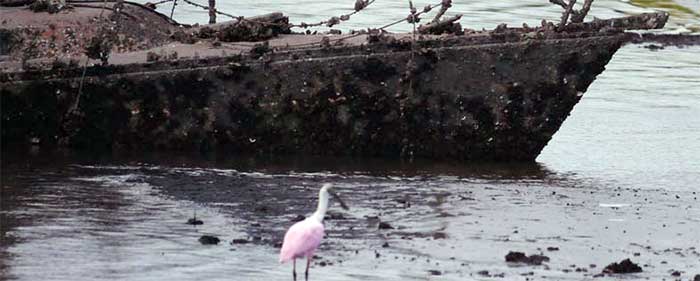Advertisement
"Life's too short to sail an ugly boat," says a popular bumper sticker. But maybe it should read: "Boats live long lives, don't let them get ugly." Here's why.

Photo: Florida FWC
Any boater worth his or her salt knows how important it is to keep their vessel, to use a time-honored nautical expression, "ship-shape and Bristol fashion." Unfortunately, on the waterways of this country, there are too many of the other kind: worn out and neglected, stripped and abandoned. Chalk them up as victims of the down economy, dreams gone sour, or the sad refuse of storms; such boats may pose a hazard to navigation or even a threat to the environment, and they certainly create a headache for waterway management authorities.
Although it's likely that abandoned vessels have been with us since early man ditched the first dugout canoe, orphan boats have been showing up in greater numbers along our coasts since the economic recession began in 2008. At best, authorities can trace some boats to legal owners who then can be required to pay for removal from the water and proper disposal. At worst, a boat could have had all identifying marks carefully removed, holes drilled into the bottom, and been left some quiet night to sink off the owner's problem list, only to surface eventually on the public's. That's why, in September 2009, the Marine Debris Program office of the National Oceanic and Atmospheric Administration (NOAA) coordinated the first national workshop to bring the topic of abandoned and derelict vessels, shall we say, to the surface. Sixteen states sent representatives of marine law enforcement, coastal management, and pollution control agencies to Miami to compare notes on how best to handle the problem they all shared in varying degrees. As might be expected, the top concern proved to be money; how could states underwrite the costs of dealing with what quickly became tagged the "ADV" — for abandoned and derelict vessel — problem? Dealing with abandoned private recreational boats usually is beyond the purview of federal agencies, so unless a derelict boat is obstructing navigation or leaking hazardous materials, state and local authorities generally have to foot the bill when an owner can't or won't take responsibility.
A number of states have abandoned-vessel removal programs and funding sources ranges from a $3 add-on to boat registrations in Washington state, to a portion of the 5-percent tax on boat sales in Maryland, to a share of state lease fees from gambling casinos in Mississippi. But the real solution is to convince owners to keep their boats from getting to the "derelict" stage of life, and since the workshop, the state of Florida appears to be the flagship on the prevention front.
The Sour Side Of Salvage
When he finally located Taramoor after Hurricane Wilma in 2005, David Wiggin's job had just started. As a member of the BoatUS Marine Insurance Catastrophe Field Team, his job was to locate members' boats and arrange salvage. Wiggin finally located the 37-foot sailboat 500 feet from open water in an environmentally sensitive mangrove thicket, surrounded by eelgrass. Finding a salvor with the equipment, time, and expertise to get the boat out took 10 days, and once work began, it took three weeks more to free the boat. Wiggin then had Taramoor taken to a secure staging area to be blocked up and stored with dozens of other damaged boats insured by BoatUS After a thorough inspection by a marine surveyor, BoatUS declared the boat a total loss and issued a check to the owner. BoatUS Marine Insurance took possession of the boat and eventually it sold at auction.
Unfortunately, according to the Florida Fish and Wildlife Conservation Commission, a surprising number of recreational vessels that are "totaled" in storms there are never salvaged. Instead of going through the complicated process themselves, many insurance companies merely write a check for the insured amount of the destroyed boat plus a percentage of the value that the owner is supposed to use to salvage the boat. Not surprisingly, many such boats aren't salvaged as the titles typically never are transferred to the insurance company.
Under Florida law, and in most other states, the owner is obligated to remove the boat and see to its proper disposal. Unfortunately, some owners may assume their sad story is over once they cash the claim check, only to be surprised by notice of a violation afterward. In other, thankfully more rare, cases, an owner may abandon the vessel and, worse, even attempt to obliterate the boat's registration and hull identification numbers to duck the unanticipated extra costs. That's Third-Degree Felony Dumping under Florida law and punishable by up to five years in prison and/or a $5,000 fine. It could also require restitution to the state for costs of removing the boat later, plus fines, community service, probation, or parole, loss of motor-vehicle as well as boat-registration privileges, and very likely, continued litigation for full repayment to the state. All that for being "left holding the boat."
Dealing With Derelicts
With one million registered boats, and thousands more visiting every year, the Sunshine State is "plagued" with abandoned vessels, according to the Florida Fish and Wildlife Conservation Commission (FWC). As of late June 2011, the agency estimated the number at 1,500, but by no means all of them recreational vessels.
"Barges, shrimp trawlers, head boats, sailboats, outboard skiffs, you name it and we've got it," says Capt. Richard Moore, who manages the agency's Waterway Management section. "The type of boat doesn't matter; it's against the law to leave any vessel 'in a wrecked, junked or substantially dismantled condition' in Florida waters." A derelict vessel could have a lawful owner, Moore notes, but it's just been sitting in the water for years, forgotten or ignored by that owner, and deteriorating to the point that it fits the legal definition. "If the owner can be found, we can say, 'Look, you can't leave that boat on the water. If it's a project, OK. Get it hauled out, take it to your backyard or someplace else to work on it.' At that point, if they haul it out, we're done."
Tip
In the past, Moore says, the state's focus had been on the removal and disposal of derelicts, at the owner's expense if possible, or using available state or federal funds, if no owner could be found. In 2008, the Florida Legislature appropriated $1.55 million for derelict removal. In six months, FWC removed 83 vessels (at an average cost of $450 per foot) including two 100-foot barges, a 90-foot steel casino boat, and a 65-foot shrimp trawler sunk in 20 feet of water.
The state budget is tight these days but Florida still must deal with its derelicts, grounded on shoals, lying under water, blown into the mangroves, and even sunk in their slips, nonetheless. "We've changed our attitude toward dealing with derelicts in the past five years," Moore says. "Our goal now is to prevent boats from getting in that condition in the first place and we've identified a way to do that, using education and local law enforcement."
Good Cop, Bad Cop
In November 2010, FWC launched its At-Risk Vessel Program and now law enforcement officers at state, local, and county levels have access to an interactive database used to catalog boats that are showing tell-tale signs of neglect: barnacle-encrusted hull, listing or grounded condition, cabin open to the elements, missing gear, no anchor light at night, "anything that, in our experience, if left unattended could quickly put the boat in the derelict category," Moore explains. In that case, the investigating officer — 20 police departments and 17 sheriff's offices around the state now participate with FWC — posts a bright yellow tag on the boat, noting the specific problems that need attention and warning the owner that the boat is "at risk of becoming a derelict vessel" under Florida law. The officer then enters the particulars of the vessel in the FWC database — type of boat, registration number, notes on condition, map coordinates, photos, and even witness statements, plus audio and video documentation. The information is then available online to other law enforcement agencies to avoid redundant investigations.

Move it, or lose it and pay! Florida's last warning before removal gets ugly and expensive. (Photo: Florida FWC)
"This is an effort to communicate with the owners, to inform them of problems that, if not corrected, will turn the boat into a derelict," says Phil Horning, who manages the system for FWC. "It's an official notice, not a violation. If possible, the officer will contact the owner and say, 'Hey, what's going on with your boat?' and that may be all that's needed." Earlier this year, Horning says FWC issued At-Risk tags to 50 vessels in Palm Beach County waters. "Only three failed to comply and take care of the maintenance problems cited," he notes. "We found that some boats had absentee owners who had been depending on someone locally to take care of their boats, but who weren't following through," Horning reports. "Unless there's a violation, like an expired registration or no anchor light, the yellow tag merely says to the owner, 'if you don't take care of your boat, if the condition persists, we will be coming back' and that's when the orange sticker comes out."
Horning explains that if the owner fails to address the problems, officers then affix a conspicuously bright, near-impossible-to-remove adhesive sticker. It's the final move-it-or-lose-it notice, giving the owner five days to get the boat out of the water or face fines and even criminal charges. "But if they call us and say, 'Hey, I was planning to take it out soon, anyway,' we'll work with them." It's when the owner does the wrong thing, like walk away from the boat, or even scuttle it, that real problems arise.
"At-Risk" Boats Now Online
We've all seen them: beached, half-sunken hulls, some tucked in backwaters, others perched on shoals or riding precariously at anchor; poorly maintained — even ignored — commercial or recreational boats that can pose problems for the vast majority of boaters who make maintaining their vessels a priority, if not a way of boating life. Now anyone can view the problem vicariously online by logging on to the public section of Florida's Statewide At-Risk and Derelict Vessel Map. The map has color-coded dots denoting three categories of at-risk boats and clicking on a dot brings up a panel with details about the boat, its condition, history, and even photos. As of July 1, the database had logged details of about one-third of Florida's derelict or at-risk boats. Although the numbers can change daily, at that time, of the 496 derelicts in the system, 170 posed hazards to navigation while 326 were deemed non-hazards. Another 58 boats in the system flew the not-so-coveted, yellow At-Risk tag.
Law enforcement officers from participating departments can update records on specific boats in real time, even from computer-equipped patrol craft, but the public cannot access certain details that are germane to continuing investigations or restricted for reasons of privacy. For more information visit Florida's At-Risk Vessel Program.
Fiberglass Isn't Forever
"Boats usually pass from owner to owner to owner as they get older, until finally they end up in the hands of someone who doesn't have the means to take care of it," says Horning. "They may live on it in a marina or at anchor, or maybe try to cruise on it, until it sinks; then they walk away and that's when we're stuck with it." Under Florida law the last owner of record may be responsible for the boat. If the owner doesn't remove it, he may be charged with a felony, lose motor vehicle and vessel registration privileges, incur other legal and court costs, or be forced to reimburse the jurisdiction — city, county, or state — that paid for the removal.
Horning says an expensive surprise can await people who have sold their boat but failed to transfer title. "In Florida, both the seller and the buyer must report the sale (to the Dept. of Highway Safety and Motor Vehicles) within 30 days," he notes. "If they don't, the former owner could be responsible if the boat becomes derelict." Every boat owner should realize that there will be an end of life for their boat. If they have an opportunity to legally sell the vessel near the end of its life, that's appropriate. But if not, the owner should have a plan to properly dispose of the vessel.

